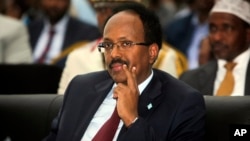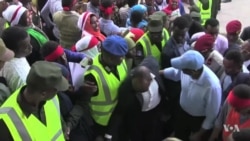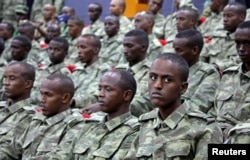In 2017, Somalia elected a new president as it battled severe drought and a resurgent al-Shabab. In October, the worst terror attack in the country's history killed more than 500 people. Meanwhile, the U.S. military is ramping up its military operations as the African Union draws down its 10-year-old peacekeeping mission.
After months of political wrangling and questions of whether a fair election could be conducted amid rampant vote-buying, Somalia's parliament elected a new leader in February, Mohamed Abdullahi Mohamed, better known as “Farmajo.”
Farmajo's win was influenced by Somalia’s past 27 years of insecurity, according to former Puntland government minister Ali Ahmed Fatah.
So people were looking for a fresh start and I think Farmajo was seen as an honest politician, by most people, including the new parliamentarians who came to town shortly before that election.
WATCH: The year in review for Somalia
Political parties return
Many Somalis want to see changes before the next election, including the introduction of a one person-one vote system. In December, the country started registering and accrediting independent political parties for the first time in nearly 50 years.
But insecurity remains a serious problem. In October, the worst terrorist bombing in the country's history, blamed on the terrorist group al-Shabab, killed more than 500 people at one of Mogadishu's busiest intersections.
Meanwhile, U.S. military involvement in Somalia has increased. The U.S. said an airstrike on an al-Shabab training camp in November killed more than 100 militants. The independent Bureau of Investigative Journalism says the U.S. carried out at least 30 drone strikes this year in the country.
But as the U.S. steps up its involvement in the region, the African Union is drawing down its forces.
New security force
The first batch of 1,000 soldiers are to leave Somalia by the end of the year, though the AU says a total withdrawal will be dictated by conditions on the ground.
Somalia says it plans to take over security responsibilities from the AU. A security force of 22,000 is to be created, and Turkey opened a new military base near Mogadishu in September to help train Somali forces.
In the midst of these political and security challenges was the drought, which affected millions of Somalis as their animals died and they went hungry.
Don't give up on Somalia
But Fatah warns against giving up hope.
“I think we are hopeful, and I think the international community is also hopeful about Somalia. And Somalis are an indefatigable group. They are not easily discouraged.”
Not discouraged, and hoping that 2018 will bring progress toward stability.







